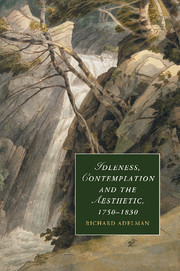Book contents
- Frontmatter
- Contents
- Acknowledgements
- List of abbreviations
- Introduction
- 1 The division of labour
- 2 Utilitarian education and aesthetic education
- 3 Cowper, Coleridge and Wollstonecraft
- 4 Coleridge's Pantisocracy, Biographia and Church and State
- Conclusion
- Epilogue: Wordsworth and Kingsley
- Notes
- Bibliography
- Index
- CAMBRIDGE STUDIES IN ROMANTICISM
Epilogue: Wordsworth and Kingsley
Published online by Cambridge University Press: 01 June 2011
- Frontmatter
- Contents
- Acknowledgements
- List of abbreviations
- Introduction
- 1 The division of labour
- 2 Utilitarian education and aesthetic education
- 3 Cowper, Coleridge and Wollstonecraft
- 4 Coleridge's Pantisocracy, Biographia and Church and State
- Conclusion
- Epilogue: Wordsworth and Kingsley
- Notes
- Bibliography
- Index
- CAMBRIDGE STUDIES IN ROMANTICISM
Summary
I want to end this study by taking a brief look at what happens to the notion of aesthetic contemplation in the wake of Coleridge, Cowper and Schiller. To do this I want to consider Charles Kingsley's novels Yeast and Alton Locke alongside Wordsworth's ‘Three years she grew in sun and shower’, and take a slightly more detailed look at how John Stuart Mill's writing negotiates the discrepancies between its utilitarian and aesthetic influences. This analysis will enable us to see that far from being emancipated from the political problems that motivated its invocation and deployment by Schiller, aesthetic contemplation maintains a tense and fraught relationship with contemporary social reality. Turning our attention to Kingsley's writing will also put us in a position to assess the impact of the model of idle thought developed by Wordsworth, Cowper, Coleridge and Wollstonecraft.
First serialized in Fraser's Magazine in 1848, Yeast: A Problem would seem to have a dual aim. In addition to depicting the social and political problems that lead, in Kingsley's opinion, to a degraded morality amongst the lower classes, the novel also concerns itself with movement of the ‘young men and women’ of the ‘day’ ‘either towards Rome, towards sheer materialism, or towards an unchristian and unphilosophic spiritualism’. In Kingsley's hands, importantly, these problems are connected.
- Type
- Chapter
- Information
- Idleness, Contemplation and the Aesthetic, 1750–1830 , pp. 141 - 172Publisher: Cambridge University PressPrint publication year: 2011



